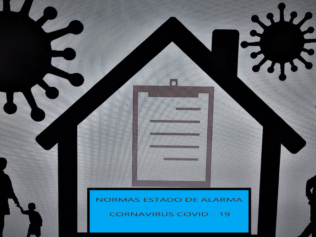Lasting power of attorney, advanced election of guardian and other protection measures for vulnerable foreign adults in Spain
https://www.balmaseda-abogados.com/wp-content/uploads/2020/04/ARTÍCULO-A-PUBLICAR.pdf
María del Mar Hernández Cortés, TEP member of STEP ( www.step.org) is a Partner of Balmaseda & Hernández Abogados in Málaga, Marbella, Estepona, University Expert in Protection of disability of vulnerable adults as well as specialized in cross border estates.
That´s why she´s collaborated with STEP magazine writing this recently published article, which you can open on the above included link to access the PDF format.
This article is thus adressed to other foreign solicitors or lawyers whose clients would need Spanish advice, but can of course be of interest for any expat or foreign adult residing in Spain, as it is only an informative article.
What is the issue?
Foreigners living in Spain who fall ill, have an accident or lose mental capacity, may be faced with unexpected problems when it comes to protecting their assets.
What does it mean for me?
Practitioners may wish to advise their clients living permanently or temporarily in Spain as to the most appropriate actions to safeguard their future wellbeing, such as lasting powers of attorney or the advance election of a guardian, in the event of such circumstances.
What can I take away?
Knowledge of the best course of action to take in the protection of vulnerable adult clients.
Although a majority of elderly people will happily enjoy their golden years, the extension of life expectancy increases the likelihood of succumbing to illness that could affect capacity.
According to a study by Málaga University on geronto-immigration,[1] 28 per cent of EU citizens living in Spain, Iceland and Norway live alone, and around 67 per cent are part of a two-member family, which means that if the adult becomes unable to make decisions about his personal and/or economic issues and care, the presence of personal or family support is absolutely crucial if no preventive measures have been taken.
For the benefit of the sick individual, their relatives and those close to them, it is absolutely critical that advisors inform their clients of the uses of a lasting power of attorney (poderes preventivos, LPA) and advance election of guardian (autotutela).
These are the only self-protective measures that any adult of any age and nationality residing in Spain can use to decide who will take care of their person and assets, were they to lose capacity. It is also the only way to preserve the dignity of vulnerable adults, giving them the chance to decide in advance how they wish to be looked after.
Article 200 of the Spanish civil code states that the incapacity of a person is a situation where someone cannot govern himself, due to any persistent physical or mental illness or deficiency.
If an adult has not granted an LPA and partially or totally loses his capacity, the alternative option is beginning a procedure of incapacitation or modification of the capacity[BI1] where a guardian will be appointed by the court after taking evidence to exactly adapt the final decision to the particular circumstances, being a much longer and more expensive option, and where the guardian appointed by the judge has not previously been elected by the disabled person.
Additionally, there is also the option of granting a testamento vital (living will) or declaración de voluntades anticipadas (advance decision), which may coincide with the health and medical decisions with the LPA.
Supporting legal framework[KG2]
Below are some brief references to relevant legal framework internationally and in Spain, including inspiring principles and also particular references to the LPOA:
- In the UN Universal Declaration of Human Rights, the protection of the freedom and dignity of every person is declared, which is the essence and foundation of the LPA.[2]
- The UN Convention on the Rights of People with Disabilities, ratified by Spain on 3 December 2007 and an integral part of Spanish law, refers to and promotes the autonomy of the dignity of the person.[3]
- The EU Charter of Fundamental Rights of the European Union, which lays out the rights to move and reside freely; dignity; freedom; free and informed consent; security; and the right of elderly people to have a dignified and independent life, serve as a basis for the LPA.[4]
- Royal Legislative Decree 1/2008.
- Preparatory legislative work in the European Council, European Parliament and European Commission, such as the following:
- Recommendation CM/Rec(2009)11 on the principles concerning continuing powers of attorney and advanced directives for incapacity (the Recommendation)[5];
- Enabling citizens to plan for incapacity: a report reviewing the follow-up action taken by Council of Europe Member States on the Recommendation;[6]
- The European Added Value of EU Legislative Action on the Protection of Vulnerable Adults; [7] and
- Report of the Legal Affairs Commission of the European Parliament of 3rd of April 2017, with recommendations for the protection of vulnerable adults.
- The Civil Code of Spain, which states that any foreign adult residing in Spain is entitled to grant an LPA, irrespective of their nationality or permanent residence.[8]
- The EU Convention on the law applicable to contractual obligations opened for signature in Rome on 19 June 1980.[9]
It would be desirable to have an EU Regulation or other international legislation for this subject, where a unique model of LPA and lasting wills would be created together with a central registry where all LPAs would be registered. This would ensure that any authority or doctor could have access to it when necessary. Revoked LPAs could also be registered to safeguard the interests of vulnerable adults.
The HagueConvention of 13 January 2000 on the International Protection of Adults includes a model of LPA that could be useful for this purpose, but only a few European countries have ratified it.
Benefit of an LPA
The dignity of the vulnerable adult is protected with an LPA because they have decided it in advance. The costs are also much more affordable than a procedure of incapacitation, and the process is simpler.
The appointed guardian(s) can immediately act for the benefit of the vulnerable adult, and the representative can act in the many areas they have been appointed for, without any need for long and costly court permissions.
Further possible procedures of incapacitation are also avoided, which can be slower, more uncertain and more expensive.
Elements of an LPA
The powers to be included in the LPA are totally flexible and should be individually adapted to the needs of the grantor, but as a brief overview:
Validity and effectiveness
The grantor can decide if they want the LPA to be valid and effective on being signed, when they are still capable and also when disability eventually appears, or if the LPA will only be fully effective if disability appears. In the latter case, it is common to include a condition where the appointed representative proves the disability with two medical certificates or in a similar way.
Personal care
It’s important to consider who will take care of the grantor if there are several guardians; if jointly or severally; and if they agree to move to a nursing home or stay at home, etc.?
Economic administration
Considerations should be given to the individual who will administer the grantor’s assets; again, if jointly or severally; and special instructions for relevant decisions, etc.?
Safeguards
Depending on the degree of confidence in the appointed guardians, it may be recommended to appoint an association or professional who periodically supervises the personal and/or economic situation of the disabled person to avoid misuse of the LPA.
Advance decisions
As mentioned above, aside from the LPA, the grantor can also sign living wills or advance decisions, which must be granted at a government health office and will be later registered in a central registry of living wills. However, it is also possible to include some powers related to advance decisions in the LPA granted before a notary and, in fact, it is relatively common to do so. That said, the LPA does not yet have access to the central registry of living wills, meaning that in medical emergencies it is important that the appointed representative brings the original LPA to the doctor, who will admit it as it is a notary power of attorney, with the only inconvenience being that it cannot be registered.
Advance appointment of guardian
Although the LPA may be granted, there are circumstances, such as a misuse of the LPA of the disabled person by the appointed person, that can result in a procedure of incapacitation[LH3] . It is therefore important that in this case the grantor includes several people that they would like to be their guardians in the LPA.
Considering the trascendence of these protective and preventive measures and the serious and vital consequences that its use might bring, it´s crucial to be advised by a specialized solicitor with university expertise in this subject and who has also studied the international law affecting this important issue.
María del Mar Hernández Cortés is an university expert in this area and has done her final project about this topic studying the international aspects.
She´s at your disposal under:
Email: maria@balmaseda-abogados.com
Tf: +00 34 952804464
Skype: maria@bhabogados
And also available for German speaking clients under:
Email: hernandez-cortes@wf-rechtsanwalt-malaga.de
[1]https://www.researchgate.net/publication/279955548_Defining_and_Coping_with_Residence_International_Retirement_Migration_to_Spain
[2] In the preamble and arts.1 and 3
[3] Articles 3.a) and 12, paras.3, 4 and 5 being of particular relevance.
[4] In the preamble, as well as arts. 1, 2a), 6, 7, 25, 26, 41.2 and 45.1,
[5] https://rm.coe.int/168070965f
[6] https://rm.coe.int/cdcj-2017-2e-final-rapport-vs-21-06-2018/16808b64ae
[7] http://www.europarl.europa.eu/RegData/etudes/STUD/2016/581388/EPRS_STU(2016)581388_EN.pdf
[8] arts.9.6 and 10.11 of
[9] arts.3 and 4.









